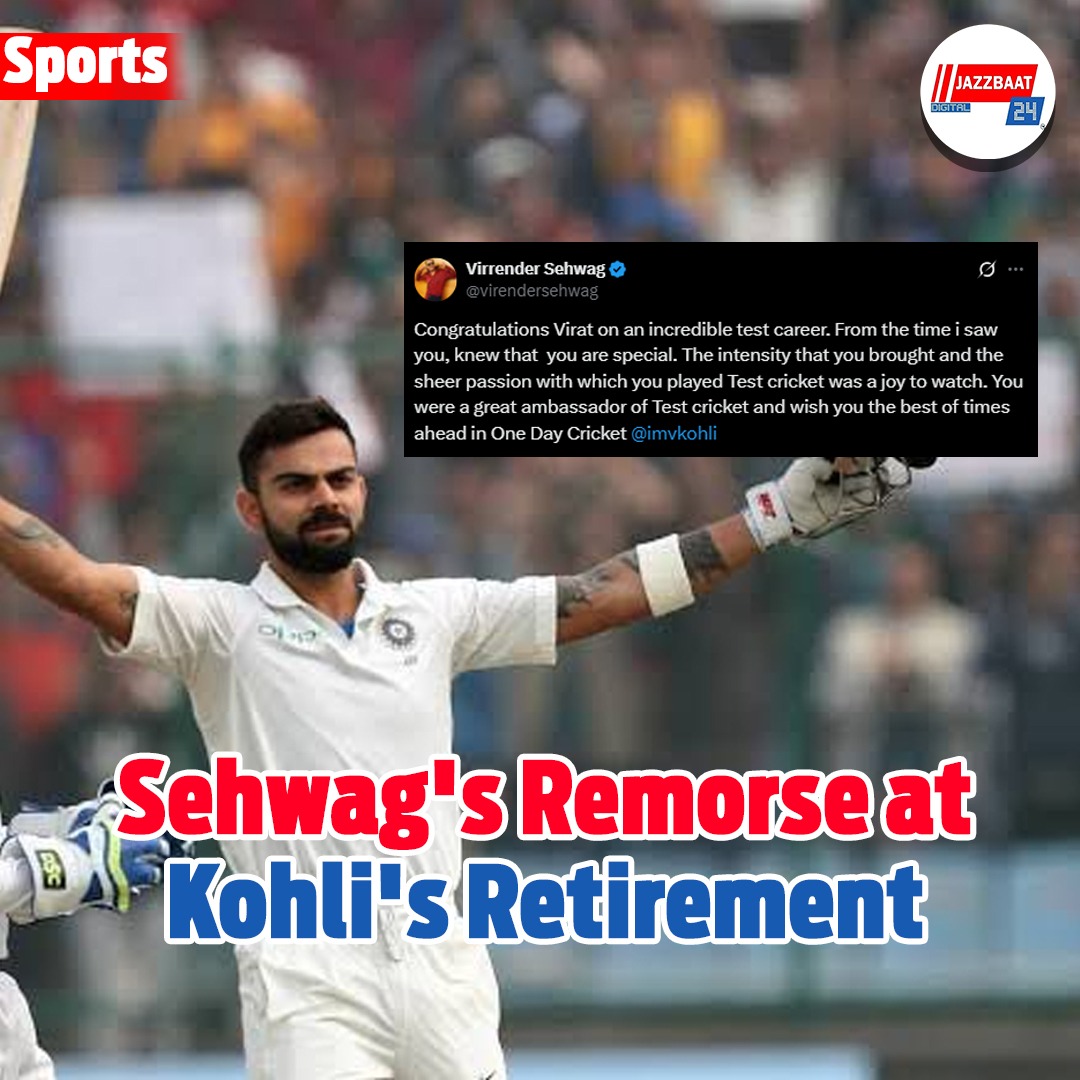
Virat Kohli's retirement has opened an emotional book in Indian cricket. With a career spanning 123 Tests, giving countless inspirational innings and helping win many matches for the Indian team, he retired from the Tests. Nevertheless, the majority of fans and pundits, along with former opener Virender Sehwag, could not accept his decision. Sehwag unequivocally clarified that Kohli could have played Test cricket for at least two more years. His body, dedication towards practice and passion for the game are not impacted at all. This sudden retirement of such a player therefore came as a shocker to Sehwag.
Kohli's retirement from Tests was while he had just crossed the boundary of 10,000 runs. He was forced to depart after a fraction more than 8800 runs. With this number in mind, retirement has asked lots of fans' questions - couldn't he have done that special thing by playing a few series more? It would have been the thing to do for the greatest batsman of a generation like Virat Kohli. But he still decided to retire without looking back, and that seems to be the reason for Sehwag's annoyance.
According to Sehwag, Kohli has the mental toughness and physical conditioning that makes him fit to keep playing international cricket for another two years at least. He further adds that at 36 years of age, Kohli is fitter than 90% of the team and continues to work out strenuously. Kohli's fitness philosophy has set a new standard for Indian cricket. He not only enhanced his own game, but also the physical fitness and professionalism of the entire team as well. Many believe that the impact of his contribution will still be seen in Team India for years to come.
Sehwag also admits, however, that Kohli's batting has been on the decline over the past few years. The way he played off-lengths, the balls which he played in the region outside the off-stump with a very unusual skill level, have been seen taking time to decide. That slight hesitation in reply could have placed him under some pressure. But the majority of analysts feel that the problem is temporary. They believe that a champion batsman like Kohli could have gotten back into his previous groove had he once been able to get himself together. But before that, he moved away from red-ball cricket.kohli may have thought about this retirement independently. Players' personal life, mental pressure, family responsibilities, or future plans also affect such major decisions. Kohli was an independent emotional player throughout his life. He knew when to stop and how to stop. perhaps he wanted to retire with a good record so that people will never forget him as a quality player.
Although there were efforts made to pay their respects to him at the Chinnaswamy Stadium, the event was postponed due to rain. The way the fans were ready to pay their respect to him explains how deep Kohli's influence is. On hearing the news of Kohli's retirement, many had come to the stadium dressed in white, something not usual as a sign of respect. This shows how intense the feelings of the ordinary people are for him.
Kohli's career is not just runs, centuries or games played. It is the dashing and aggressive cricket that India had a taste of under his leadership that puts him in a different class. Ahead of the opposition in their own ground, rattling the bowlers' nerves or upholding the team's fielding decorum - all these were facilitated under Kohli as captain. India has secured many historic victories under his leadership, especially away from home in Test cricket.
Though he will now only play white-ball cricket, his retirement from Tests signals the end of an era. His go-for-theory mentality, intensity with every ball, and on-field leadership style which gave Indian cricket its oxygen are now becoming even more nostalgic. Kids will certainly draw inspiration from him, but it still remains difficult to envision anybody as a Kohli replacement.
Sehwag's comment is therefore less a personal complaint, but an expression of a kind of romantic affection for cricket. A legend, aware of the time and influence of another legend, says, "He could have played more"—it is as though it is something that cricket fans have to say. Sehwag himself was a cricketer who played his own game and also retired unobtrusively. And when he said that Kohli still had a right to be in the Test team, then after it, not only emotion, but also experience and deep understanding of the game dominated.
At the culmination of it all, while a player's retirement is an extremely individualistic decision, it brings about the emotions and memories of the country's cricket enthusiasts. It need not be said that Virat Kohli is at its very heart. He will not just be missed on the field, but also at every pivotal moment of the Test match, where an isolated standing batsman would have been a ray of hope for the team—that spot is left empty.
But a player like Kohli does not retire and disappear overnight. He remains an inspirational force, running in the veins of each budding player, and an inspiration to create new history. Virat Kohli may have retired from Test cricket, but he will remain in the heart of Indian cricket forever.